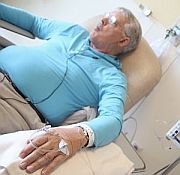
THURSDAY, July 23, 2015 (HealthDay News) — Chemotherapy may worsen quality of life for some cancer patients who are nearing death, a new study finds.
“Oncologists may presume there to be no harm in giving dying patients chemotherapy, but these data point to more harm than benefit,” study author Dr. Holly Prigerson, from Weill Cornell Medical College in New York City, said in a college news release.
The research included more than 300 patients with advanced cancer who had about four months to live. Their average age was about 59. About half of the patients were receiving what’s known as palliative chemotherapy when the study began.
Palliative chemotherapy is generally given to people who have fewer than six months to live, according to the researchers. The hope is that palliative chemotherapy will ease symptoms and extend survival.
But that wasn’t the case for those patients who started the study with good ability to care for themselves. In fact, for people who could still work and perform day-to-day tasks, chemotherapy was associated with a worsened quality of life, the study found.
The study also found that for people who had a moderate or poor ability to care for themselves at the start of the study, such chemotherapy didn’t improve their quality of life.
“These data show that incurable cancer patients with a limited life expectancy who use chemotherapy are likely to impair the quality of their remaining days,” Prigerson said.
She and her colleagues wrote that American Society of Clinical Oncology (ASCO) guidelines “regarding chemotherapy use in patients with terminal cancer may need to be revised to recognize the potential harm of chemotherapy use in patients with progressive metastatic disease.”
The study was published online July 23 in the journal JAMA Oncology.
Many doctors question the benefits of chemotherapy for cancer patients who are nearing death. And an ASCO expert panel has said the use of chemotherapy in cases where there is no proven benefit for patients is “the most widespread, wasteful and unnecessary practice in oncology,” according to a journal news release.
The study findings “suggest that equating treatment with hope is inappropriate,” Dr. Charles Blanke and Dr. Erik Fromme, from Oregon Health & Science University, wrote in an accompanying editorial.
“Even when oncologists communicate clearly about prognosis and are honest about the limitations of treatment, many patients feel immense pressure to continue treatment. At this time, it would not be fitting to suggest guidelines must be changed to prohibit chemotherapy for all patients near death without irrefutable data defining who might actually benefit, but if an oncologist suspects the death of a patient in the next six months, the default should be no active treatment,” the editorial concluded.
More information
The U.S. National Cancer Institute has more about end-of-life care for cancer patients.
Copyright © 2026 HealthDay. All rights reserved.

